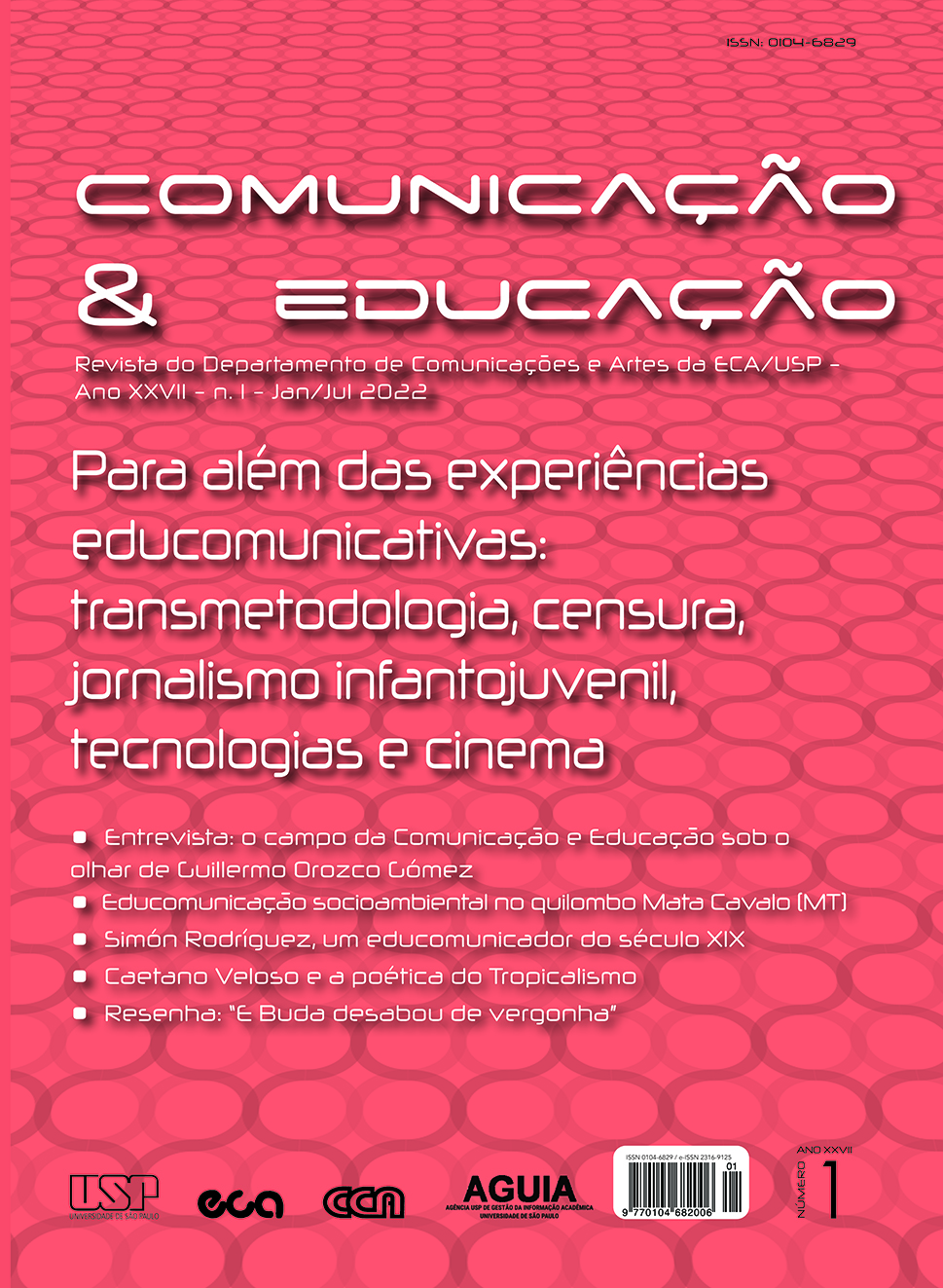Technologies and mobile devices in remote learning
DOI:
https://doi.org/10.11606/issn.2316-9125.v27i1p178-194Keywords:
Methodology, Reception, Formation, Technologies, Remote teachingAbstract
This article presents two theoretical-methodological paths of inclusion and uses of technologies in the creation of authoring training strategies to meet the learning demands with remote teaching, in two different experiences: the first, in the initial years of basic education, and the second, in a Pedagogy degree. To this end, it analyzes, by the proposed paths, the alternatives found, and the plans based on the teaching and student role, in the appropriation of available applications and devices. The scope is to understand some of the possible paths that the groups have proposed and experienced in the training. With a participatory methodology, it is also guided by reception research, since it individualizes in listening and observing interactions and records, the speeches and the elaborations of the subjects in the contexts.
Downloads
References
BARBIER, Rene. A escuta sensível em educação. In: REUNIÃO ANUAL DA ANPED, 15., 1992, Caxambú. Anais […]. Caxambú: ANPEd, 1992. p. 187-216.
BOGDAN, Robert; BIKLEN, Sari. Investigação qualitativa em educação: uma introdução às teorias e aos métodos. Portugal: Porto, 1994.
BRASIL. [Constituição (1988)]. Constituição da República Federativa do Brasil. 40. ed. São Paulo: Saraiva, 2007.
BRASIL. Ministério da Educação. Portaria nº 343, de 17 de março de 2020. Dispõe sobre a substituição das aulas presenciais por aulas em meios digitais enquanto durar a situação da pandemia do novo coronavírus – covid-19. Brasília, DF: MEC, 2020. Disponível em: http://www.planalto.gov.br/CCIVIL_03/Portaria/PRT/Portaria%20n%C2%BA%20343-20-mec.htm. Acesso em: 26 set. 2020.
CENTRO REGIONAL DE ESTUDOS PARA O DESENVOLVIMENTO DA SOCIEDADE DA INFORMAÇÃO. TIC Educação 2019. São Paulo: Cetic.BR, 2019. https://cetic.br/media/analises/tic_educacao_2019_coletiva_imprensa.pdf. Acesso em: 26 set 2020.
EBOOK Coronavirus around the world. [S. l.: s. n.], 2020. 1 vídeo (3 min). Publicado pelo canal Suéller Costa. Disponível em: https://youtu.be/5G9AXf-jmfs. Acesso em: 6 jun. 2022.
JUAZEIRO. Decreto nº 217/2020, de 13 de março de 2020. Dispõe sobre as medidas preventivas para o enfrentamento da emergência de saúde pública de importância nacional, estadual e internacional decorrente do coronavírus e H1N1, e dá outras providências. Juazeiro: Gabinete do Prefeito Municipal, [2020]. Disponível em: https://portais.univasf.edu.br/seac-gr/arquivos/decreto-medidas-preventivas-coronavirus.pdf. Acesso em: 26 set. 2020.
LAPA, Andrea; GIRARDELLO, Gilka. Gestão em rede na primavera secundarista. In: PORTO, Cristiane; OLIVEIRA, Kaio E.; CHAGAS, Alexandre (org.). WhatsApp e educação. Entre mensagens, imagens e sons. Salvador: EDUFBA, 2017. p. 29-48.
MORAN, Manuel J.; MASETTO, Marcos T; BEHRENS, Marilda A. Novas tecnologias e mediação pedagógica. 13. ed. Campinas: Papirus, 2000.
MOREIRA, José A.; TRINDADE, Sara D. O WhatsApp como dispositivo pedagógico para a criação de ecossistemas educomunicativos. In: PORTO, Cristiane; OLIVEIRA, Kaio E.; CHAGAS, Alexandre (org.). WhatsApp e educação. Entre mensagens, imagens e sons. Salvador: EDUFBA, 2017. p. 49-68.
MY FAMILY – 1st grade. [S. l.: s. n.], 2020a. 1 vídeo (15 min). Publicado pelo canal Suéller Costa. Disponível em: https://youtu.be/MPfkZ4nNZ34. Acesso em: 6. jun. 2022.
OLIVEIRA, Elida. Quase 40% dos alunos de escolas públicas não têm computador ou tablet em casa, aponta estudo. G1, Rio de Janeiro, 2020. Disponível em: https://g1.globo.com/educacao/noticia/2020/06/09/quase-40percent-dos-alunos-de-escolas-publicas-nao-tem-computador-ou-tablet-em-casa-aponta-estudo.ghtml. Acesso em: 26 set. 2020.
OROZCO GÓMEZ, Guillermo. Educomunicação: recepção midiática, aprendizagens e cidadania. São Paulo: Paulinas, 2014.
PREPOSITIONS of place – 4th grade. [S. l.: s. n.], 2020b. 1 vídeo (12 min). Publicado pelo canal Suéller Costa. Disponível em: https://youtu.be/6YxFXoLdPzU. Acesso em: 6 jun. 2022.
Downloads
Published
Issue
Section
License
Copyright (c) 2022 Edilane Carvalho Teles, Adriana Maria de Almeida Campana, Suéller Costa

This work is licensed under a Creative Commons Attribution 4.0 International License.
I authorize the publication of the submitted article and soon the copyrights to the magazine, in the printed and electronic version, if it is approved after the evaluation of the reviewers.
I understand that readers may use this article without prior request, provided the source and authorship are mentioned. Readers are not authorized to use this article for reproduction, in whole or in part, for commercial purposes.

































